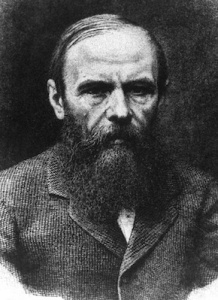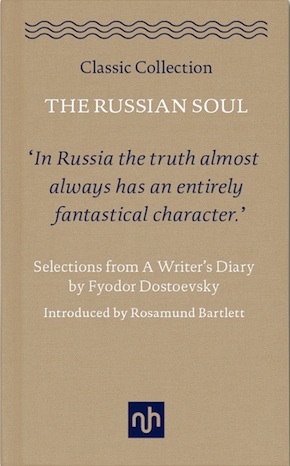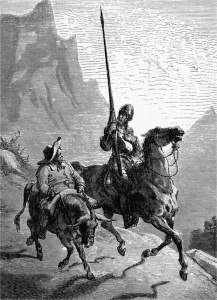A lie is saved by a lie
by Fyodor DostoevskyOnce upon a time Don Quixote – that very well-known knight of the doleful countenance, the noblest of all the knights the world has ever seen, the simplest in soul and one of the greatest in heart – while wandering with his faithful attendant, Sancho, in search of adventure, was suddenly struck by a puzzle that gave him cause to think for a long while. The fact is that often the knights of old, beginning with Amadis da Gaula, whose stories have come down to us in the absolutely truthful books known as the romances of chivalry (for acquisition of which Don Quixote did not regret selling several of the best acres of his little estate) – often these knights, during their glorious peregrinations that were so beneficial to the whole world, would suddenly and unexpectedly encounter entire armies of even a hundred thousand warriors sent forth against them by some evil power, by evil sorcerers who envied them and prevented them in all sorts of ways from achieving their great goal and being united at last with their fair ladies. It usually happened that when a knight encountered such a monstrous and evil army he would draw his sword, invoke the name of his fair lady for spiritual succour, and then hack his way into the very midst of his enemies, whom he would annihilate to the last man. This would seem to be quite a simple matter, but Don Quixote suddenly fell to thinking, and on this problem: he suddenly found it impossible to believe that a single knight, no matter how strong he might be and no matter if he were to go on wielding his armipotent sword for a whole day without getting tired, could at once lay low a hundred thousand enemies, and this in only one battle. Killing each man would still take some time; killing a hundred thousand men would take a great deal of time; and no matter how he wielded his sword, a single person could not do this at once, in a few hours or so. And yet these trustworthy books told of such deeds being done in just a single battle. How could it happen?
“I have solved this puzzle, Sancho, my friend,” Don Quixote said at last. “Inasmuch as all these giants, all these wicked sorcerers, were the evil spirit, their armies likewise possessed the same magical and evil nature. I presume that these armies were composed of men quite unlike you and me, for instance. These men were no more than an illusion, the product of magic, and in all probability their bodies were unlike our own but were more akin to those of slugs, worms, and spiders, for example. And thus in his powerful hand the knight’s steadfast and sharp sword would, when it fell upon these bodies, pass through them in an instant, almost without resistance, as if through air. And if that is so, then truly with a single blow he could cut through three or four bodies, and even through ten if they were standing close together. Hence one can understand that the thing would be greatly expedited and a knight really could annihilate whole armies of such evil blackamoors and other monsters…”
Sancho believes completely in all the preposterous dreams of the great knight, and the whole time he never once doubts that the Don will at last conquer the island for him!”
Here the great poet and seer of the human heart perceived one of the most profound and most mysterious aspects of the human spirit. Oh, this is a great book, not the sort that are written now; only one such book is sent to humanity in several hundred years. And such perceptions of the profoundest aspects of human nature you will find on every page of this book. Take only the fact that this Sancho, the personification of common sense, prudence, cunning, the golden mean, has chanced to become a friend and traveling companion to the maddest person on earth – he precisely, and no other! He deceives him the whole time, he cheats him like a child, and yet he has complete faith in his great intellect, is enchanted to the point of tenderness by the greatness of his heart, believes completely in all the preposterous dreams of the great knight, and the whole time he never once doubts that the Don will at last conquer the island for him! What a fine thing it would be if our young people were to become thoroughly steeped in these great works of world literature. I don’t know what is now being taught in courses of literature, but a knowledge of this most splendid and sad of all books created by human genius would certainly elevate the soul of a young person with a great idea, give rise to profound questions in his heart, and work toward diverting his mind from worship of the eternal and foolish idol of mediocrity, self-satisfied conceit, and cheap prudence. Man will not forget to take this saddest of all books with him to God’s last judgment. He will point to the most profound and fateful mystery of humans and humankind that the book conveys. He will point to the fact that humanity’s most sublime beauty, its most sublime purity, chastity, forthrightness, gentleness, courage, and, finally, its most sublime intellect – all these often (alas, all too often) come to naught, pass without benefit to humanity, and even become an object of humanity’s derision simply because all these most noble and precious gifts with which a person is often endowed lack but the very last gift – that of genius to put all this power to work and to direct it along a path of action that is truthful, not fantastic and insane, so as to work for the benefit of humanity! But genius, alas, is given out to the tribes and the peoples in such small quantities and so rarely that the spectacle of the malicious irony of fate that so often dooms the efforts of some of the noblest of people and the most ardent friends of humanity to scorn and laughter and to the casting of stones solely because these people, at the fateful moment, were unable to discern the true sense of things and so discover their new word – this spectacle of the needless ruination of such great and noble forces actually may reduce a friend of humanity to despair, evoke not laughter but bitter tears and sour his heart, hitherto pure and believing, with doubt…
However, I wanted only to point out this most interesting feature which, along with hundreds of other such profound perceptions, Cervantes revealed in the human heart. The most preposterous of people, with a crackpot belief in the most preposterous fantasy anyone can conceive, suddenly falls into doubt and perplexity that almost shake his entire faith. What’s curious is the thing that was able to shake it: not the absurdity of the crackpot notion itself, not the absurdity of wandering knights who exist for the benefit of humanity, not the absurdity of those magical wonders told of in those ‘absolutely truthful books’ – no, on the contrary, it was something external and secondary, an altogether particular thing. The preposterous man suddenly began yearning for realism! It wasn’t the appearance of sorcerers’ armies that bothered him: oh, that’s beyond any doubt; and how else could these great and splendid knights display all their valour if they were not visited by all these trials, if there were no envious giants and wicked sorcerers? The ideal of the wandering knight is so great, so beautiful and useful, and had so captivated the heart of the noble Don Quixote that it became utterly impossible for him to renounce his faith in it; that would have been the equivalent of betraying his ideal, his duty, his love for Dulcinea and for humanity. (When he did renounce his ideal, when he was cured of his madness and grew wiser, after returning from his second campaign in which he was defeated by the wise and commonsensical barber Carrasco, the skeptic and debunker, he promptly passed away, quietly, with a sad smile, consoling the weeping Sancho, loving the whole world with the mighty force of love contained in his sacred heart, and yet realizing that there was nothing more for him to do in this world.)
It’s possible to believe in the first and most important dream with no more doubts, solely thanks to the second, even more absurd fantasy.”
No, it was not that; what troubled him was merely the very real, mathematical consideration that no matter how the knight might wield his sword and no matter how strong he might be, he still could not overcome an army of a hundred thousand in the course of a few hours, or even in a day, having killed all of them to the last man. And yet such things were written in these trustworthy books. Therefore, they must have lied. And if there is one lie, then it is all a lie. How, then, can truth be saved? And so, to save the truth he invents another fantasy; but this one is twice, thrice as fantastic as the first one, cruder and more absurd; he invents hundreds of thousands of imaginary men having the bodies of slugs, which the knight’s keen blade can pass through ten times more easily and quickly than it can an ordinary human body. And thus realism is satisfied, truth is saved, and it’s possible to believe in the first and most important dream with no more doubts – and all this, again, is solely thanks to the second, even more absurd fantasy, invented only to salvage the realism of the first one.
Ask yourselves: hasn’t the same thing happened to you, perhaps, a hundred times in the course of your life? Say you’ve come to cherish a certain dream, an idea, a theory, a conviction, or some external fact that struck you, or, at last, a woman who has enchanted you. You rush off in pursuit of the object of your love with all the intensity your soul can muster. It’s true that no matter how blinded you may be, no matter how well your heart bribes you, still, if in the object of your love there is a lie, a delusion, something that you yourself have exaggerated and distorted because of your passion and your initial rush of feeling – solely so that you can make it your idol and bow down to it – then, of course, you’re aware of it in the depths of your being; doubt weighs upon your mind and teases it, ranges through your soul and prevents you from living peaceably with your beloved dream. Now, don’t you remember, won’t you admit even to yourself what it was that suddenly set your mind at rest? Didn’t you invent a new dream, a new lie, even a terribly crude one, perhaps, but one that you were quick to embrace lovingly only because it resolved your initial doubt?
September, 1877. Translated by Kenneth Lantz © 1994 Northwestern University Press
Extracted from The Russian Soul: Selections from A Writer’s Diary (Notting Hill Editions, £14.99)
 Fyodor Dostoevsky (1821–1881) was born in Moscow, the son of a physician, and educated at the Military Engineering College in St Petersburg. His first novel, Poor Folk (1846), was well received. In 1849 he was arrested and sentenced to death for his involvement with a group of Utopian Socialists, the Petrashevsky Circle, only to be reprieved at the last moment. His experience of four years of hard labour and imprisonment in Siberia led to a profound change in his ideology, which is reflected in all his subsequent fictional masterpieces, from Notes from the House of the Dead (1862), to Crime and Punishment (1866) and The Brothers Karamazov (1880), as well as his journalism, including A Writer’s Diary, completed during his last decade. The Russian Soul, introduced by cultural historian and translator Rosamund Bartlett, is published by Notting Hill Editions.
Fyodor Dostoevsky (1821–1881) was born in Moscow, the son of a physician, and educated at the Military Engineering College in St Petersburg. His first novel, Poor Folk (1846), was well received. In 1849 he was arrested and sentenced to death for his involvement with a group of Utopian Socialists, the Petrashevsky Circle, only to be reprieved at the last moment. His experience of four years of hard labour and imprisonment in Siberia led to a profound change in his ideology, which is reflected in all his subsequent fictional masterpieces, from Notes from the House of the Dead (1862), to Crime and Punishment (1866) and The Brothers Karamazov (1880), as well as his journalism, including A Writer’s Diary, completed during his last decade. The Russian Soul, introduced by cultural historian and translator Rosamund Bartlett, is published by Notting Hill Editions.
Read more



